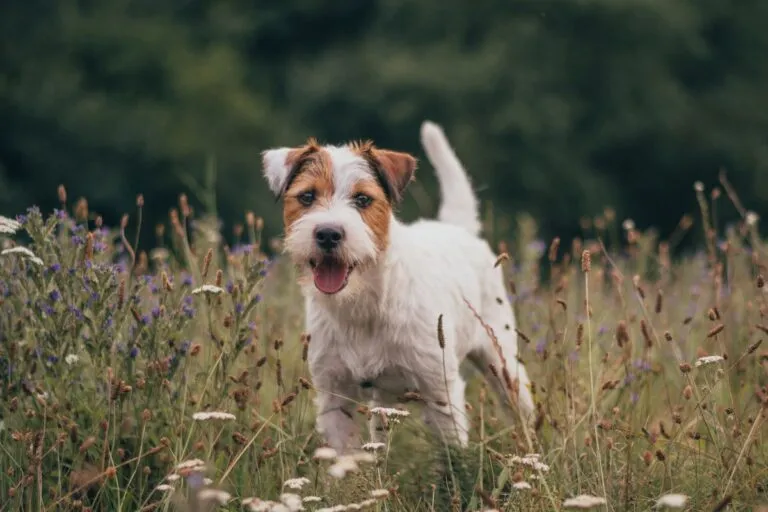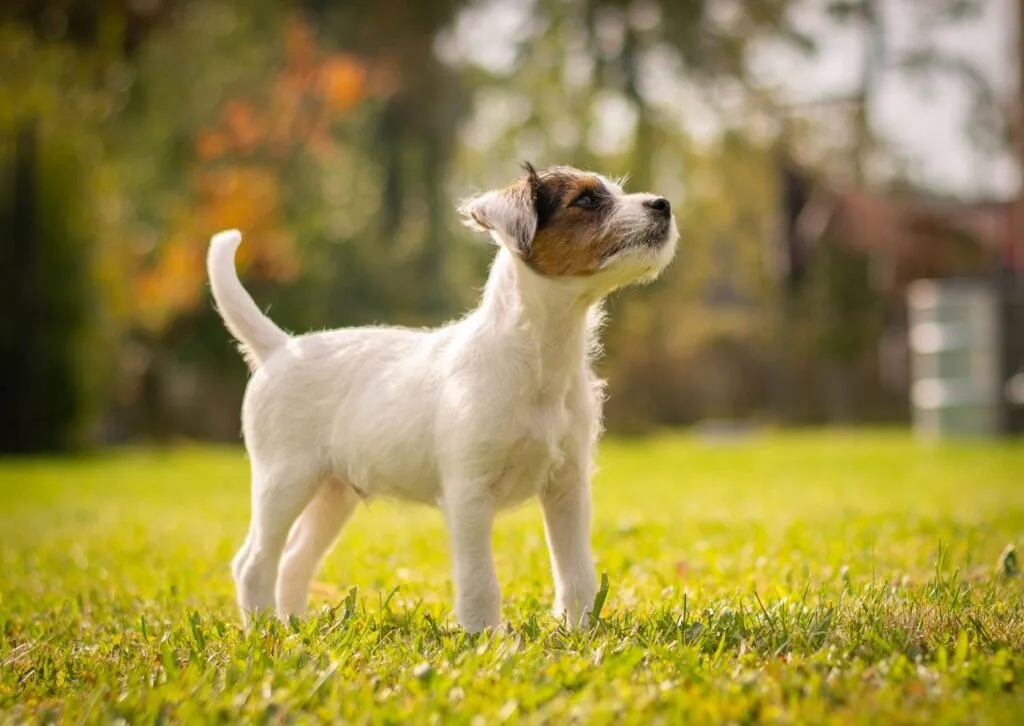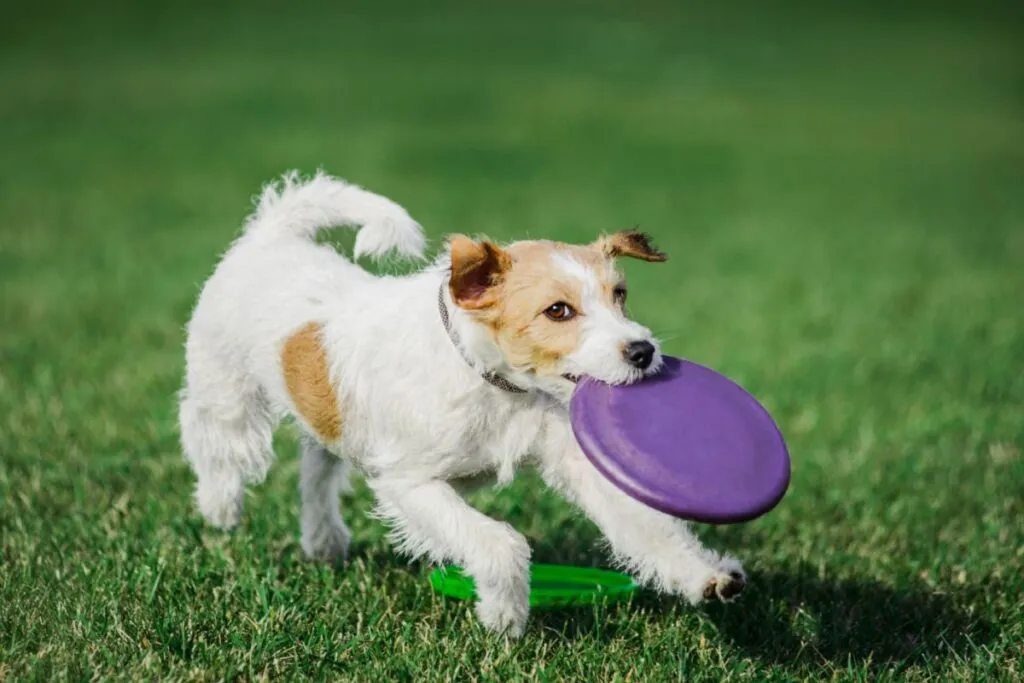Medium Size Poodle
The Parson Russell Terrier is a high-legged dog from Great Britain, very loyal to humans. It's also an excellent and versatile hunting dog that fits well into an active family thanks to its friendly nature.

Lernen Sie den familienfreundlichen Parson Russell Terrier kennen.
The Parson Russell Terrier is a fast and agile dog – this is due to its body structure. Its rather square body is well-muscled with harmonious proportions.
A key criterion in all recognised standards is the so-called spannability (chest girth), ensuring a resemblance to the fox’s anatomy. After all, a broad chest would hinder it in clearing a fox den.
Though the FCI standard doesn’t specify exact measurements for the chest girth, with the ideal height at withers being approx. 36cm for males and 33cm for females, the spannability value should be around 35 to 40cm. Depending on the body size, small Parson Russell Terriers weigh about 6 to 8kg.
The fur colour of all dogs of this type is either entirely white or predominantly white. Predominantly white dogs may also have tan, yellow, or black markings. All combinations of these colours are permissible.
There are also several variations in fur texture: Parson Russell Terriers come with rough, smooth, or broken coats. All three types have a dense undercoat, reliably protected from the elements.
The small, white-haired Brit with the short coat is primarily known as a hunting dog. It helps the hunter wherever it can: it skillfully drives out foxes and badgers from their dens, reliably rouses wild boars and deer, tracks down dead or injured animals, and proves its skills in duck hunting as an excellent retriever.
The Parson Russell Terrier is a tirelessly enthusiastic working dog that gratefully takes on any task given by its leader, completing it reliably and quickly. Even though its infectious enthusiasm may not suggest so, it always works diligently, never acting aggressively or timidly. Injuries from wild boar or foxes are therefore very rare for it.
At the same time, the Parson Russell Terrier works very independently, never losing contact with its master. Even during larger drives, it keeps checking with the hunter to ensure it is fulfilling its task satisfactorily.
As long as the Parson Russell Terrier gets plenty of exercise and attention, it proves to be a gentle and affectionate house dog. It willingly follows its pack leader. This requires not only sufficient physical activity but also consistent training.
As a terrier, the Parson Russell needs a clear place in the hierarchy – always the lowest rank – and strict rules. Owners neglecting their role as pack leader and placing their dog on the same level as themselves might face unpleasant surprises.
According to a Russell Terrier’s logic, only one can be “the boss” – if its owner doesn’t take this role, the self-assured and dominant dog will take charge. Show your dog from a young age that you are in control. Prove with calm and patience that it can rely on your competence and authority.
Its human-oriented nature and friendly, gentle disposition make the Parson Russell Terrier an excellent family and companion dog. It particularly bonds with children, sharing their passion for playing and romping. It enthusiastically participates in ball games in the garden or a game of tag.
The calm dog never holds a grudge against its small human playmates. Despite its pronounced hunting instinct and fearlessness, it’s an amiable and sociable family dog – provided it lives in a sportily active family.
But: anyone wanting to keep the lively and tireless dog as a family pet must be aware that the Parson Russell Terrier needs plenty of exercise and engagement and must know how to handle its tendency towards dominance.
 © Kristyna / stock.adobe.com
© Kristyna / stock.adobe.com
Like its ancestors, the Parson Russell Terrier loves horses. Its paradise is living on a horse farm, where it can pursue its interests and accompany its humans on long rides.
If you can’t provide a whole stable, you should offer it alternative activities. The nature-loving feline is better suited to a house with a garden than in the city.
The Parson Russell Terrier is not suitable for beginners. Although it has the necessary submissive nature due to its friendliness, it remains a terrier with a high level of assertiveness and stubbornness.
Therefore, the self-confident bundle of energy needs an owner who responds to its peculiarities with necessary consistency and a good portion of patience. For harmonious living, it’s vital that the dog gets plenty of exercise and engagement. The more opportunities it has to run and play, the less likely it will get into trouble.
Hunting and roaming are in the Parson Russell Terrier’s blood. Despite its compact size, it needs plenty of space – especially outdoors. It enthusiastically joins in cycling tours or jogging and explores its surroundings freely.
To keep the dog both physically and mentally stimulated, almost any form of dog sport is suitable. Whether it’s agility, obedience, flyball, or competition dog sports: thanks to its dexterous motor skills, extraordinary running and jumping abilities, stamina, and intelligence, the Parson Russell Terrier excels in nearly all sports.
To determine your dog’s specific needs, it’s helpful to carry out a detailed analysis based on individual criteria with the vet. Thankfully, feeding your Parson Russell isn’t more complicated than other breeds.
As with all dogs, the Parson Russell Terrier primarily needs high-quality proteins. To receive all essential nutrients, it also needs vegetables, fruit, and water.
The Parson Russell Terrier is easy to care for in all coat variations. For smooth-coated dogs, regular brushing, about once or twice a week, is sufficient.
For rough-coated or broken-coated (stockhaired) dogs, dirt clings more easily to the fur. Therefore, brushing them more frequently is necessary. During shedding season, you should also comb out the undercoat with a wire brush and pluck loose top coat with your fingers.
The most crucial prerequisite for healthy puppies is healthy parent animals. Therefore, ensure all required health tests have been administered and additional voluntary examinations have been conducted. Also, ask for a copy of the test results along with the pedigree.
To prevent compromising the breed’s health, dogs with genetic defects or already manifesting diseases must be strictly excluded from breeding.
Thanks to strict breeding guidelines, the Parson Russell Terrier remains a robust and vital working dog with relatively few breed-specific diseases.
The average lifespan is about 12 to 14 years.
A significant issue, if any, could be eye problems. This mainly applies to wild breeds where the animals weren’t adequately tested before breeding. Dogs from reputable breeders should be tested for the following eye diseases:
Apart from the mentioned eye diseases, other conditions are known but fortunately very rare in dogs from a reputable breeding background.
This includes patellar luxation, a kneecap displacement, or cases of unilateral or bilateral deafness caused by the piebald (piebald) gene in white dogs.
 © olgagorovenko / stock.adobe.com
© olgagorovenko / stock.adobe.com
The English vicar John Russell started breeding terriers with the female dog “Trump”. The primary goal was their suitability as hunting dogs. Appearance was secondary; Russell focused on the dogs’ utility.
He crossbred various working terriers from Devon, New Forest, and further afield, primarily using Fox Terriers, suitable for fox hunting by horse. Russells’ “working terriers” were initially “mongrels”, often superior in hunting skills to purebred terriers.
Later crossbreeding attempts with breeds like Corgies, Beagles, or Bull Terriers after Russell’s death yielded disappointing results. Consequently, breeders focused again on the type promulgated by Russell. Depending on leg length (high or low), the dogs were called Jack Russell Terrier or Parson (Jack) Russell Terrier.
Though some cynologists consider Russell’s influence on today’s breed minimal, his preferred working terrier remains popular among hunters and riders.
Since World War II, Parson Jack Russell Terriers have grown in popularity as hunting dogs as well as family and companion dogs.
Until 1999, the FCI called the Parson Russell Terrier the Jack Russell Terrier. In 2001, it grouped all high-legged dogs under “Parson Russell Terrier” and short-legged types under “Jack Russell Terrier”.
The original English standard doesn’t distinguish this way. To avoid confusion and highlight their dogs as high-legged, many breeders prefix “Parson” to the breed name, referring to the same dog type as the FCI’s Parson Russell Terrier.
Wanting to buy a Parson Russell Terrier? First, consider what type and purpose you have in mind. If you want a high-legged working terrier for hunting, seek a different breeder than those seeking a lively family dog.
Before choosing a breeder and a puppy, thoroughly research their breeding goals. It’s essential to know which standard the breeder follows. Does it adhere to FCI standards or the English original?
A serious breeder‘s standard or club affiliation alone doesn’t determine the dog’s quality. It is crucial to approach breeder selection with care.
Meet various breeders and thoroughly observe their facilities and dogs before making a decision. The Parson Russell Terrier Club Germany website is a helpful resource for finding breeders.
A good breeder will be open and honest and discuss their breeding practices and breed preferences with you. A serious breeder will ask about your expectations and, if your needs don’t match their dogs, might advise against purchasing one.
A breeder devoted to the love of a breed won’t sell dogs at any price, especially if they feel the buyer isn’t suitable for this demanding breed. Prices can go from £1,000.
The Parson Russell Terrier is a good choice for active families with children. Those with experience in dog training will find living with these hunting dogs harmonious and will delight in their wonderful four-legged friends.
Fans of the Bearded Collie agree that those who aren't familiar with this dog breed simply have to get acquainted with it. And those who have experienced how a Bearded Collie bolts across meadows with its flowing fur, how it rolls around full of energy and joy and how it attentively and observantly takes into account its owners wishes become simply addicted to this original dog breed and its unique charm.
The Goldendoodle isn't a breed, but a pairing between Golden Retrievers and Medium or Standard Poodles. Marketed as a low-maintenance dog for allergy sufferers, this hybrid is enjoying increasing popularity amongst dog lovers, similar to the Labradoodle.